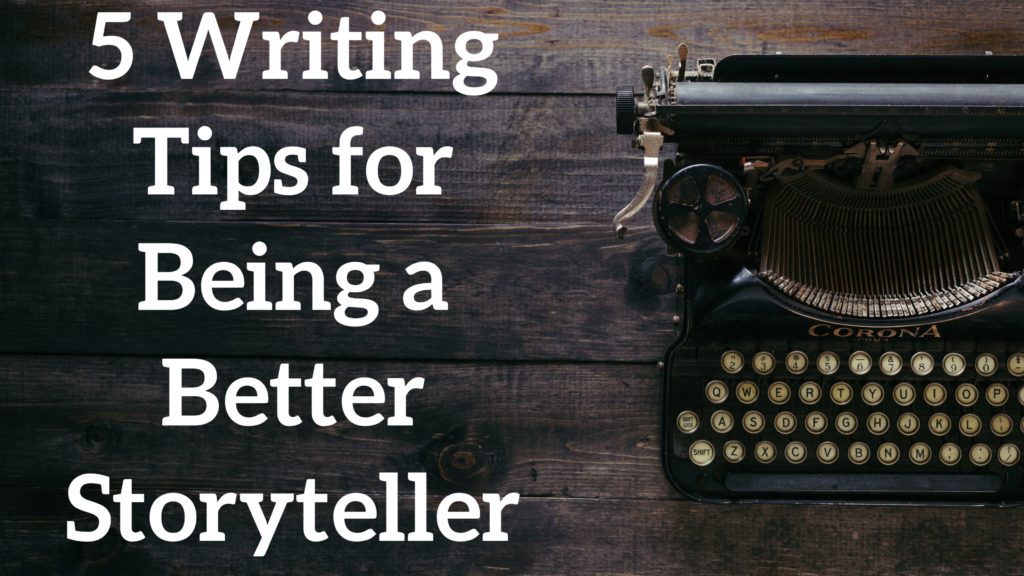
5 Tips For Being a Better Storyteller that Hollywood No Longer Cares About (Apparently)
To be honest, in the recent making of movies and books there has been a push toward moving away from good dynamic storytelling to “trying to be different” and being “politically correct.” To have an agenda beyond telling an amazing story to viewers and readers.
What happened to the good ole’ days when you wrote or told a story so that the audience enjoyed it and it was good?
What happened to just being a good storyteller?
It would be one thing if they added in a few beliefs that add to the story or make it better, but when they blatantly add this type of propaganda and material at the expense of the story being told well and executed well it can be quite disappointing.
And let me state very clearly, I have absolutely no problem with beliefs and moral being in stories, BUT only if it makes sense and makes the story better. The problem I’m seeing heavily these days is when the writer cares more about their worldview and message than the story itself. This makes for poor writing and poor storytelling.
If you are going to be a storyteller and in the storytelling business, be it movies, TV, Books, etc. You should really take a hard look at why you are telling a story and if you like it yourself.
One of the keys to knowing you are headed in the right direction is to like what you are creating so much that it makes you curious to see where it will end up and you enjoy people reading or watching it.
If you are telling a story and you yourself aren’t entertained by it, why would anyone else be and we as creators that want to excel should be asking ourselves, “will anyone else enjoy this?”
It’s a hard question, to be honest with ourselves, but if we are going to make stories that readers enjoy we have to put ourselves in their shoes.
Is my story compelling?
Does it have a good flow?
How does the ending make my readers feel? Resolved and appreciative or unresolved?
If we aspire to be great storytellers we must appreciate and take note of the fact that our readers are “investing” their time to read what we write.
They take a “chance” on us of whether or not at the end of the time they have given to us, will they feel like it was worth their time?
Asking yourself good questions like this on a regular basis as a writer can help keep you on the right track for why you are a storyteller at all and how you can make the future of storytelling excellent compared to where it has ended up today with certain over-glorified “critics?”
In a world with story saturation, too many writers just trying to be different, and not keeping their main priority on telling a compelling story, can we do better?
I think yes, we can! 🙂
All that to say, you can use certain storytelling tricks that have been around for ages but have been neglected as of late in Hollywood and other major storytelling productions.
These tips and tricks are not so “secret” as one might think, but if you didn’t know them from studying the art and foundations of storytelling they might appear new to you.
So let’s dive in!
Keep these in mind the next time you are writing and you will do yourself and your readers a huge service:
- Plot Must Move Characters And Characters Must move Plot
- Create Good Plot Questions but Leave None Unanswered
- Great Stories Have Characters That Change Respectively With Time And Experiences
- A Boring Story Shouldn’t Be Written As An Excuse To Write One Exciting Scene
- A “Secret” Message Behind The Story Shouldn’t Dictate Or Override The Direction the Story Takes
# 1 Plot Must Move Characters And Characters Must Move Plot
In reality, we have coined a little phrase. You may have heard it in a science class before. It is “cause and effect.”
To be a great storyteller we must think of cause and effect when writing.
In a great story, the author has done an amazing job of using cause and effect between characters and plot in such a way that you as the consumer didn’t think much about it. You just accepted it because well IT MADE SENSE.
This is huge in good storytelling. If what’s happening in your plot doesn’t motivate your characters or your characters don’t motivate the plot in a natural cause and effect sort of way, you will have many readers stopping mid-sentence questioning why or how something important happened in your story instead of accepting it without question.
Here’s a good example of using cause and effect.
For example: Polly loves chocolate chip cookies, but Polly’s mom said “No sweets on Tuesdays.”
So it came to pass that on one Tuesday afternoon poor Polly waited till mommy dearest went to the grocery store. On her way out, mommy said, “Remember, no cookies today Polly, so stay away from the cookie jar.”
Polly said “Yes, mommy dearest!” and out the door, mommy went.
Polly watched through the window as mommy pulled out of the driveway and down the street until she was completely out of sight.
The coast was clear, Polly sprinted to the cookie jar and looked inside. The Chocolate Chip cookies looked more golden brown and more crispy than normal. Polly loved when they were more crispy with a little bit of chewy in the middle.
Something inside Polly told her that she should listen to mommy and she gave her word that she wouldn’t eat them, after all, it reasoned we can have them guilt free tomorrow. That’s not so long to wait, is it?
Something else inside Polly pulled and tugged relentlessly without words the urge to eat them all in one sitting!
Polly listened to the latter and she reached for the lid and lifted it.
Just then she heard a terrifying growl behind her!
She dropped the lid and turned around to see a terrifying giant hairy monster towering above her.
“Get away from the cookie jar!” it roared.
Polly screamed and ran into the other room.
Now at this point, if I’ve done a good job of using the plot to motivate the character and the character to motivate the plot, a good cause and effect relationship if you will, then you won’t be questioning the plot or Polly’s actions based on what you know and are learning about her.
If I’ve done a really good job as a storyteller, then you might even be curious about what’s going to happen to poor Polly next.
If a writer is doing their job well than readers will almost always be wondering, “what happens next?”
This silly little story will hopefully help you see how you can make your characters move and motivate the plot and how your plot can motivate them.
By saying that Polly loves chocolate chip cookies we give the audience motive as to why Polly would have an internal battle about taking the cookies when she knows she shouldn’t.
This also takes liberty to assume that most readers understand the conflict of knowing they should obey parents and authority figures but also knowing the inner struggle of wanting to do something their authority has told them they can’t do (I didn’t explain that in the story because it is what we call an “assumed law” or “natural law.”)
As far as plot goes we set it up that the plot is Polly isn’t allowed to have her favorite treats on Tuesdays. By declaring that the protagonist loves something but can’t have it sets up a problem for the protagonist that makes the reader intrigued as to how they will resolve that problem. So we used the plot to motivate Polly to lie and then disobey and we used Polly to carry the plot along from her first problem to her second even bigger problem (the big hairy monster appearing behind her.)
If you’re doing your job well as a storyteller you will find unique and clever ways to use what you reveal to readers about the plot and about the characters to affect each other in a delightful give and take, cause and effect game.
This game goes back and forth until you decide it’s time to resolve all the big questions and problems that lead to a resolution. Also use the plot to reveal more about your character and use your character to reveal more plot points, major and minor.
If you are doing this well, your readers won’t even know you’re doing it, they will just be engaged and enjoying it.
A storyteller’s job is to keep their audience engaged and enjoying the story from beginning to end.
# 2 Create Good Plot Questions but Leave None Unanswered Storyteller
A personal pet peeve of mine in stories I watch or read is loose ends or unanswered questions. Actually both my wife and I will sit and talk about a show after we watch it and talk about whether there were holes in the plot.
Sometimes the storytellers bring up these really great questions that pique your curiosity and then they do absolutely nothing with it. This is a HUGE letdown. I can’t tell you how many times my wife and I have watched what seemed like it was going to be a great show only to be let down by unanswered questions and plot holes.
Either they switched writers in the middle or the writer was trying to get away with something by making you curious to get your attention but then being too lazy to really have a good answer for that question. <—don’t do this to your readers.
Creating curiosity for your readers is a great service to them and a tool for making your writing more interesting, but only if you are going to give them the joy of answering the question you made at some point in the story.
As a storyteller, it is like making a promise to a friend. Any time you purposely create a question for your audience you are making a silent promise to them that you are going to answer that question later on. They are counting on it.
If you create a question with no intent to answer it just to keep them reading you are cheating your audience and they will lose interest in your work because there is no pay off in the investment that they have made by buying it and reading it.
Creating Curiosity in your Story and Why
Everything in your story must move the plot or the characters forward. If you create a question that leads your readers forward your answer to that question also needs to push the plot forward, help create character depth, and be enjoyable.
If you are going to create curiosity in your reader, make sure the payoff is good and clever. Give them what they are looking for, THE ANSWERS to their curiosity 🙂
# 3 Great Stories Have Characters That Change Respectively With Time And Experiences
This one is more of a personal opinion than writing code, but if you want to make your characters more realistic and more interesting, they are going to develop and change slightly as your time with them goes. Not all of them should change. Some should be static and not change, but some should also change with time and experience.
There are many factors that come into play with character change.
How much time are we spending with the character?
What type of trauma are they going through?
How old are they and what have they gone through in their past?
How do other characters react to their change?
Is it dramatic or subtle?
These are just a few important factors but there are definitely more.
Unless your character is very old and we are only with them a day or two they should change in some ways as we go because real people change as they live.
Some things about them don’t change and some things do.
Is it a growing-up story?
Do they cut their hair and start wearing make-up?
Is it more dior?
Do they start drinking and smoking heavily?
It is a complicated task but worth thinking about and including in your writing as an up and coming storyteller.
For example, in Lord of the Rings. Gandalf does not change much and this is appropriate for his character, but Frodo and Samwise do go through a deep maturing and change.
# 4 A Boring Story Shouldn’t Be Written As An Excuse To Write One Exciting Scene or Idea
This seems like a no brainer, but it should be said. A good story isn’t made from a motive of putting certain ideas into it. In recent films and writing you can tell that a good story isn’t always the motive of why something shows up in a story, sometimes the writer wants to share a political message or write a pretty looking scene. Things like this should not be motivations for writing a story or adding them in.
And all annoying political messages aside, some writers want to write about an amazing battle or a dramatic conversation, or an intergalactic space race. By all means, write what you want to, but we should watch out for writing entire novels around wanting to write out one battle.
There is nothing wrong with writing neat ideas that come up, but some of these ideas should go through a writing process.
They should be written as a short story first so that way you can enjoy writing and write what you want and get it out on the page, but give it time to marinate and look to expand it through a process that makes sense. Be wary of looking to write a big long book, just to make one specific scene come to life. You might find that the rest of the book is a letdown.
And at the same time, don’t be afraid to start with an idea and see where it ends up.
There are always two sides to a coin. I know for a fact that many wonderful stories started with a small idea and grew from that so definitely write any ideas you have down. I don’t mean not to write your ideas down and create many short stories along the way.
What I mean here is if you are going to create a beautiful scene or share a message or create an amazing battle don’t be lazy about making the story the best it can be and putting it in seamlessly and cleverly.
Be a storyteller, not just a writer.
In my opinion, I think that great stories should be written from the motive of writing an amazing story. That’s usually when the story turns out good. It is that simple.
It used to be that companies had to make good stories to be seen and heard. Now companies are so huge that they continue to make content with other motives.
I would love to see new writers and storytellers rise up that are interested in telling a story because it’s good and enjoyable and they want to serve their audience.
# 5 A “Secret” Message Behind The Story Shouldn’t Dictate The Direction the Story Goes
Some would say that the meaning behind your story is more important than the story itself. I would disagree.
That would mean that adding a scene or changing the ending to send the message instead of creating a well-made story is more important.
That is a horrible idea. Have you ever been reading an amazing story only to be let down by the ending and realize that the whole point was some political world message?
Disappointing isn’t it?
I mean think about it from a reader’s point of view. When you go into the book store and start browsing, what are you thinking?
“I’m looking for an enjoyable read. Something that will entertain me in the genre that is my favorite. I would love to find something that’s so good that I can’t wait to tell my friends and family about it.”
When have you ever walked into the romance section thinking, “I hope I find a romance with a secret message hidden in it about being respectful to the President no matter whether I agree with them or not?”
No, no one has ever looked for that. If someone is entertained by politics they look for books on politics and so on.
So be a better writer than these “secret message” writers that trick their readers into reading their message when really the reader is looking to be entertained.
If you are going to put an important message into your story, be sure that it makes sense and makes the story better. Make sure that it adds to the story and doesn’t destroy it in the end.
What are your thoughts about amazing storytelling?
Do you agree or disagree that Hollywood cares more about a message than telling a good story?
What is a tip you would add to tell better stories?
What advice would you give other storytellers?
Do you think the storytellers of Hollywood are doing a good job?
What is your favorite genre as a storyteller? Do you feel like that genre is being treated fairly by the storytellers that are influential right now?
Hope this helps!
Happy writing!
Other reads you might be interested in:
5 Tricks How to Hide Your Villain Right Before Their Eyes
10 Tips How to Write Villains that Play Mind Games with Their Victims
4 Tips How to Write your Character Hitting Rock Bottom
10 Toxic Bad Habits That’ll Crush Your Fictional Character’s Relationships
How to Write From Your Villain’s Mind.
How To Write 4 Scenes That Reveal Who Your Character Is Seamlessly
Psychopath: How to Write The Perfect Psychopath
8 Tips How to Write the Perfect Sociopath
Fictional Characters: 28+ Bad Habits to Introduce to Your Fictional Characters
List of 10 Weapons for Fictional Characters
List of 10 Bad Habits Fictional Characters Need Help Breaking
Resources:
How to Start a Blog in 11 Simple Easy Steps in 2020
6 Easy Practical Steps to Becoming a Better Writer in 30 Days or Less
Why Start a Blog? 6 Reasonable Reasons to Quickly Start a Blog in 2019
What Should I Write About: 22 Writing Prompts to Give You BIG IDEAS
Enjoying 5 Tips For Being a Better Storyteller that Hollywood No Longer Cares About?
Take a moment and consider sharing this social-friendly image to say thanks and feel free to comment with your thoughts below! 🙂

Make sure your posts are readable. Use this readability score check
Want to check out a writer’s community to test your writing and get feedback?
Check out these FREE trial resources from Amazon for when you work from home (or are stuck at home 🙂 )
Free Prime Membership Trial:
Try Amazon Prime 30-Day Free Trial
Try Prime Discounted (Free Trial)
Make your Free Amazon Wedding Registry:
Create an Amazon Wedding Registry
Get Free Video Channels Trial with Prime:
Join Prime Video Channels Free Trial
Try Free Amazon Family Trial:
Join Amazon Family (30-day Free Trial)
Get Unlimited Music for Free (30-day free trial):
Free movies and TV shows trial:
Join Amazon Prime – Watch Thousands of Movies & TV Shows Anytime – Start Free Trial Now
Free Prime for students trial:
Free Baby Registry:
Shop Amazon – Create an Amazon Baby Registry
Free trial of Twitch Prime:
And for when you REALLY work at home:
Create Amazon Business Account
It is the Amazon you love, for work. Make workplace procurement easier with convenient delivery options, simplified purchasing workflows, multiple payment options, and a competitive marketplace with business-only pricing and quantity discounts. Anyone who makes purchases for work (eg. procurement specialists, office administration, IT departments, etc.) can create a FREE account for their business. Customer must be from a verified business in order to successfully create their Amazon Business account.





I am tired of stories that cater to the politically correct group. It compromises the Bible.